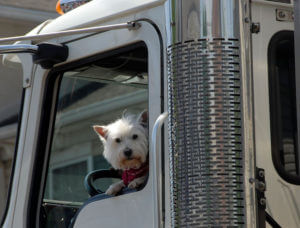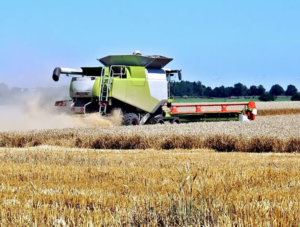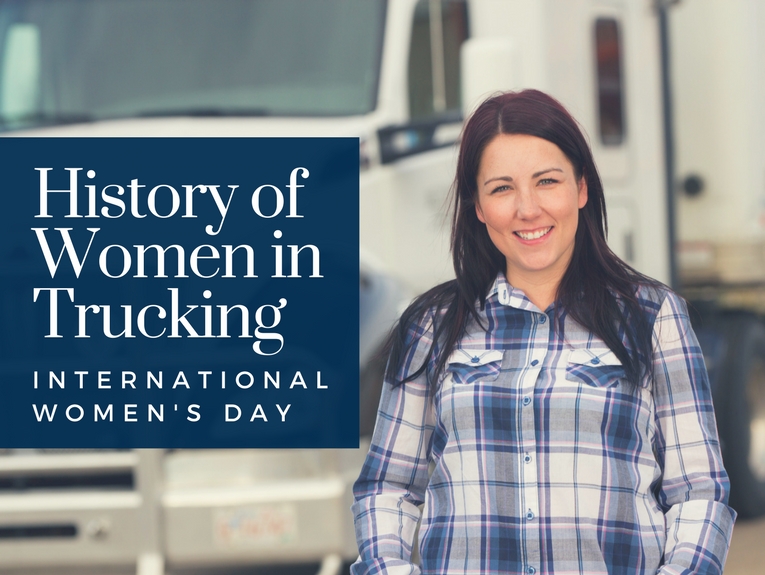Trucking
Helpful Information About Potential Trucking Jobs
-

Tips to Trucking with Your Pet
It can get lonely on the road. Many trucking companies have realized that an easy way to boost the morale of drivers is to allow truckers to bring a friend on the trip—especially a four-legged friend! If you're one of the lucky drivers working for a pet-friendly company, it's important to make sure you understand all the company's and your pet's requirements before setting out on the road together.Check Your Company's Regulations
- Types of pets allowed
- Weight and size restrictions for pets
- Additional fees for damage and cleaning
- Where pets are permitted in your truck
- Waiting period before pets are allowed
Basics of Having a Pet on the Road
- Bring pet vaccination records
- Get a Certificate Of Veterinary Inspection for crossing state lines
- Train your pet on which parts of the truck are off-limits
- Have plenty of blankets, toys, and treats
- Bring a leash and poop bags for stops
- Bring cleaning supplies for any accidents
- Have a travel crate for delivery and pick-up stops
- Bring plenty of water
Bringing Your Pet Along for the Ride
If you're excited about the potential of bringing a pet on the road, the first step is finding out which companies are the right fit for you. Trucking Truth is a great resource and has created a helpful list of pet-friendly companies and their basic restrictions. Once you find a company that fits both your trucking and pet aspirations, take the time to thoroughly understand the pet rules. Having a pet on the road is a joy, but it does require more work than riding alone. If you're prepared, it makes everything run more smoothly. If you or a loved one is embarking on a career in trucking, then you've come to the right place! Contact us to learn more about our training program and how we can help you achieve your career goals. -

Celebrating Father's Day with Your Trucking Dad
Finding the perfect gift for Father's Day can be a challenge. For those families that have a truck driver as a father, this task can be even more complicated. It can be difficult to come up with new ideas for every occasion or holiday. Most of their time is spent on the road so choosing something practical that he can use in his cab or while traveling is a good option. Here are a few gift ideas for the truck driving dad.XM Radio
Truck drivers spend the majority of their time on the road in their cabs. XM radio can be a great way to entertain while driving. There are hundreds of stations to choose from including music and talk radio. Subscriptions generally range from around $30 for a 6 month period.Sheet Set
Getting a good night's sleep is very important for a truck driver. A truck driver should be as comfortable as possible even when on the road. The beds in trucks are usually a twin or twin XL size. Sleeping bags and pillowcases are also great accessories to purchase with a sheet set.Bluetooth Headset
Talking on the phone while driving can be very dangerous and is also against the law in several states. Truck drivers need that connection with their loved ones and should be able to talk while driving. Purchasing a hands-free headset can solve that problem. They can stay connected while driving safely.Portable Mini Fridge
A mini fridge can be a great addition to a driver's truck. The mini fridge gives them the ability to pack options that are healthier and can also save them time. Look for a 12-volt option that is easy to use with a cigarette adapter.Compact Microwave
A small microwave can also eliminate the number of stops that a driver has to take. This can help them deliver their loads quickly. A small microwave can also help them eat healthier. They can heat up vegetables, pasta, and many low-calorie frozen meals whenever they chose to. Remember this, if your dad is not yet a truck driver, acquire an application from the Advanced Career Institute as a gift. The best vote of confidence in his dream is to help him with that first step. This Father's Day celebrate your dad and let him know how much he means to you and your family. From all of us at Advanced Career Insitute, we wish you a Happy Father's Day. -

A Study Guide for Passing the CDL Test
Like any test, the Commercial Driving License (CDL) exam requires study and preparation because you will be tested on a lot of information. However, simply trying to memorize the entire CDL manual, which is typically around 180 pages long, is not the best way to prepare for the exam. Instead of wasting countless hours becoming tired and frustrated, study smart. Here are six study steps to help you prepare for and pass your CDL exam.Plan Ahead
Cramming a day or two before your CDL exam will not yield the best exam results. Besides causing sleep deprivation and trouble focusing, you won't retain important material that you need to understand as a responsible, safe driver. Pick a day to take your exam and start studying ahead of time so that you are fully prepared. If you are new to the exam, consider taking a training course online or in-person, which some states require. There are a number of programs you can choose from, so shop around for a course that works best for you. For example, at Advanced Career Institute, we offer Class A and Class B CDL training courses as well as CDL refresher courses for experienced drivers in California.Find Out What to Study
Are you wondering what exactly is on the CDL exam? Take a look at the DMV CDL study guide, which breaks down the test section by section in terms of the CDL manual. For a detailed, free, comprehensive guide, check out Study Guide Zone's CDL Test Study Guide. No matter what kind of CDL you are studying for, you'll have to know General Knowledge. Based on the type of CDL you wish to receive, you'll have to study specific topics, such as School Buses and Hazardous Materials.Take a Diagnostic Exam
It doesn't make sense to study what you already know. To find out what you do know and what you don't know, take a diagnostic exam. Driving-tests.org allows you to select your state and take a free, full-length general knowledge practice exam. Taking a diagnostic test will also help you get a feel for the exam so you'll be better prepared on exam day.Collect Your Study Materials
Make sure that you have everything you need to help you study. The most important tool will be the CDL manual, which you can download on your state's DMV website. You can also pick up a hard copy from your local DMV. The DMV endorses DMVCheatSheets.com, which provides a number of cheat sheets with a money-back guarantee if you do not pass your CDL exam after using the service. Consider purchasing a CDL test prep book, downloading an app from the Apple App or Google Play stores, and saving helpful websites with study guides and other prep tools.Study What You Don't Know in an Effective Environment
Using the results from your diagnostic exam, review the material that you don't know in the CDL manual. If you have purchased a test prep book, you can find the sections that you need to review using the table of contents. When studying, make sure you have a distraction-free space. Remember to take breaks and have some snacks nearby to refuel.Test Your Knowledge
After reviewing what you need to from the CDL manual, test your knowledge through flashcards and additional practice questions. Union Test Prep offers free CDL flashcards and practice tests based on specific subjects. There are a number of apps that can also help you study on the go. You can also ask your family and friends to help quiz you on the sections that you have trouble with. Using these tips and tricks can help you pass your CDL exam. Of course with your training at Advanced Career Insitute, we will help prepare you for this exam by going over every little detail. The goal is, by the time you go in for the test, all questions should be second nature to you. For more information about passing your California CDL exam and our training options, contact us today! -

CDL Related Jobs that aren't Over the Road
Many people begin pursuing a Commercial Driver’s License with the intent of becoming over-the-road truck drivers. Why not? It’s a common profession that is in high demand. There are plenty of jobs available! However, it’s not the only show in town. There are also non-trucking jobs you can get with a CDL. A CDL is a surprisingly versatile document, and while driving is almost always on the docket if you are getting a CDL, driving a big rig is far from the only occupation you can hope to pursue. Indeed, there are many vehicles you can operate and an equal number of potential employers who will look at hiring you if you depend on your level of experience. These jobs can each bring their nuances that offer commercial drivers a surprising level of diversity to their daily work experience.Highway Maintenance Technician:
Highway construction and repair projects often require the use of large vehicles, which means people are needed to drive those vehicles. Everything from dump trucks and skid steers to concrete mixers and paint trucks are used for highway maintenance, so if you want this job, you’d better put your work boots on. Often a Class B CDL is the minimum requirement for this position.Engineering Equipment Operator:
As an Engineering Equipment Operator, you will operate a variety of heavy machinery, including dump trucks and trash compactors, and will help prepare the terrain for upcoming construction projects. Depending on where in the country you are working and the geographical structures around you, and the nature of the business that employs you, you can work in any number of environments up to and including bodies of water.Construction Equipment Operator:
Few fields have as diverse a set of big vehicles as the construction industry. Skid steers, dump trucks, knuckle boom loaders, track hoes, loaders, flatbeds, bush hogs, cranes, and steamrollers. You name it, the construction guys use it. All of them require an operator who possesses a CDL.Tractor Trailer Technician:
While not required in most states, having a CDL is a big plus for most tractor-trailer technicians. It stands to reason that it is better to be qualified to drive a vehicle you are working on. Tractor-trailer technicians don’t haul loads with their trucks, but they certainly are good at fixing them. Maintaining fleets of trucks is a big job that is usually performed by a team of semi-truck techs, and is a vital part of the trucking industry.Terminal Manager:
Another job that doesn’t require most workers to have a CDL, but it greatly helps, is a Terminal Manager. Terminal Managers are the field managers of a trucking company and are responsible for organizing, planning, and implementing transportation solutions. In other words, they manage trucking company workloads.Delivery Driver:
Delivery drivers don’t have the prodigious time on the road that perhaps an over-the-road hauler does, but the two occupations are close cousins. Businesses as diverse as furniture companies and medical equipment suppliers often provide delivery services and often employ workers with commercial driver’s licenses. Interested in one of these non-trucking jobs you can get with a CDL? Advanced Career Institute can help you start your career in trucking. Check out our programs and the opportunities available to you. -

The Importance of Ag Transportation
In celebration of National Ag Day on March 20th, let's give a nod of appreciation to the Ag Transporters who do the hard work within the industry. If you are curious about the job and considering joining the ranks, you should definitely ask these three important questions...What is Ag Transportation?
Ag Transportation is the community of men and women who drive the country's farm-fresh food from where it's grown to wherever it needs to go. Advanced Career Institute's training will give you all the skills needed to learn the basics of truck driving. Students will also learn how to transport the important agricultural products grown in California.What is the importance of Ag Transportation?
Truck drivers transport around 500 million tons of grain produced in the US every single year. California's farms and ranches produce over one-third of those vegetables and two-thirds of the fruits and nuts for this country. The most efficient system for transporting these fresh and healthy goods are the highways and truck drivers of the state. Goods often need to be transported more than once before they reach their final destination. Those that do these important jobs of ensuring the quality and safe delivery of these products are Ag Transporters.What are the benefits of being an Ag Transporter?
The benefits of being an Ag Transporter are vast. Ag Transporters are the first point of contact for receiving and transporting the agricultural products and livestock vital to the food industry. All you need to qualify is a high school diploma and the CDL Certification we provided with our 20-week Ag Transportation training. It's also important to consider that the current future outlook for work as a truck driver is extremely promising. As a Ag Transporter, you will have several job opportunities with competitive pay and great benefits. Are you interested in joining the Ag Transportation field? Advanced Career Institute can help you get started! Contact us today to learn more about our training options and the opportunities available for you. -

Women are Making Their Mark in Trucking
Updated with the most recent information March 2020 In honor of International Women's Day on March 8th, Advanced Career Institute would like to acknowledge the hard work and pioneering spirit of some of the trucking industry's most notable women. These bold and determined ladies paved the way for those to come, transforming the entire industry in the process. Women still only make up around 5% of the trucking workforce, but that number is steadily climbing as more women rise to the challenge and earn their Commercial Driver's License (CDL).Trailblazing Women
Luella Bates (1897-1985) was the pioneer who first showed the world what women could do behind the wheel. During WWII, she stepped into a traditionally male job to fill the vacancies left by the war. Luella was such an excellent truck driver that she stayed on after the war ended, outperforming her male counterparts. Next came Lillie Drennan (1897-1974), with her 10-gallon hat and loaded revolver, she was quite an intimidating figure. She became the first licensed female truck driver, and the first woman to own her own fleet. Lillie was also a staunch advocate for gender and racial equality. She personally hired and trained her diverse and exceptionally safe workforce. Adriesue "Bitsy" Gomez (1943-2015) followed in their footsteps. Bitsy formed the Coalition of Women Truck Drivers to combat the pervasive sexism in trucking culture. Through victories in the courts and successful public relations campaigns, Bitsy helped break-down the barriers that were keeping women out of trucking.How Has Trucking Changed for Women
- Recruiting more women – Trucking companies are making big changes to attract female drivers. Carriers are offering more practice time in truck driving simulators, female driver liaisons, internal support groups, and classes on sexual harassment awareness and self-defense.
- Support Networks – Organizations such as Women In Trucking and REAL Women in Trucking, Inc provide support, job listings, and the opportunity to connect with other female truck drivers.
- Female-friendly trucks – Ryder System Inc. has redesigned their cabs to be more ergonomic or women, with adjusted seat height and more accessible placement of handles and gauges.
Some Challenges for Women in Trucking
- Safety challenges: Pay extra attention to where you’re stopping and walking at night, whether at truck stops or in remote areas. Don’t roll down your window for anyone other than police or someone you know. Focus on safe driving and your employers will value you for keeping yourself, along with their equipment and loads, safe.
- Interpersonal issues: Women may face criticism from co-workers or loading dock personnel. Don’t be daunted by bad attitudes. Let respect received equal respect given. Ignore disrespect and laser-focus on the work, and your job at hand–and don’t let others blow your cool.
- Staying connected to family and friends: Staying in touch is easier with today’s tech. Use Skype or Facetime to have video chats at stops. Send regular text updates (which help with safety concerns, too). Schedule time at home for work/life balance.
Why Women Should Obtain a CDL
Thanks to women like Luella, Lillie, and Bitsy, the trucking industry now welcomes female drivers. Young women just entering the workforce, or those who find themselves job-searching after a lifestyle change (such as divorce, empty nest, or job loss), may consider trucking as a possibility. Forward-thinking companies recognize this trend and are doing more to recruit and retain female truckers. Truck manufacturers are redesigning cabs and other equipment to accommodate the typically smaller frames of women, leading to greater comfort and less risk of injury. Women in trucking also have a strong support network, meaning they no longer have to face obstacles and hardships alone. Now is the perfect time for women to take charge and get behind the wheel. It takes a lot of grit and toughness to succeed as a commercial truck driver, but thanks to the bold female drivers of the past, we know women can do it just as well as men can. Are you ready to earn your CDL? Advanced Career Institute is ready to help make that happen!


 All
All Trucking
Trucking Welding
Welding From the Experts
From the Experts